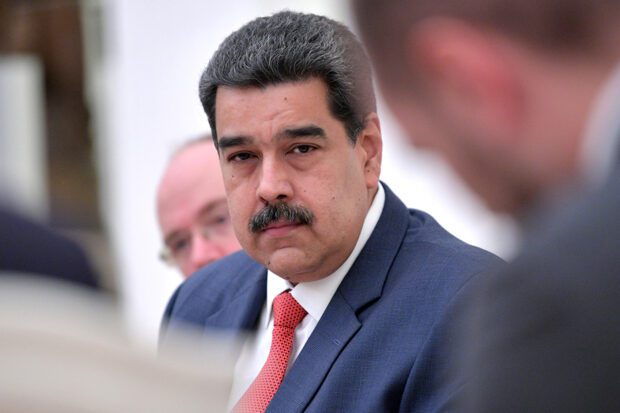
In August, Trump secretly issued a directive approving use of military force in other countries “to target Latin American drug cartels.” This would give the Pentagon authority to invade other countries or to attack vessels of other countries at sea. This is illegal on multiple levels, of course, as “Congress” is supposed to have the power to declare war and in the absence of war, invasions and piracy are crimes.
The excuse used by the United States has been and remains drug trafficking, but inexplicably the only culprits are cartels and leaders with Spanish names; their U.S. counterparts or partners do not seem to exist, even though the volumes of drugs, weapons and profits involved—big enough to represent “a threat to the security of the United States”—must have some organized structure in the United States also, no?
This most recent threat is directed primarily at two countries that the United States has been unable to subdue or intimidate recently: Mexico and Venezuela. But aggressive U.S. tariffs against Brazil, alongside its hundreds of sanctions targeting Cuba, Venezuela and Nicaragua, make clear that Washington, D.C., is working on new threats designed to force other nations into submission.
This is classic U.S. behavior although under Trump the government has mostly not bothered with the pretenses of justifications such as “democracy” or “human rights.”
Venezuela
This directive coincides with increasing the bounty on Venezuelan President Nicolás Maduro to $50 million, on the absurd pretense that he is the “head of the Cartel de Los Soles.” This cartel does not appear to exist anywhere except in the wet dreams and political rhetoric of Trump, Secretary of State Marco Rubio and company; certainly no independent evidence exists for any involvement at all of the Venezuelan government in drug trafficking.
It’s not a new idea of this regime, however. Similar accusations were used in Panama in 1989, in Colombia in the first decade of the 21st century and in Honduras in 2009 and onward to destabilize and overthrow governments, and in 2015 Obama used this as an excuse to launch economic attacks on Venezuela.
The $50 million bounty is exactly half of what Blackwater mercenary boss Erik Prince demanded as a payment 10 months ago, saying that for $100 million he would overthrow the Venezuelan government and the United States could “just sit back and wait for the magic to happen.”
In response, then-Senator Rubio, along with Senators Rick Scott (R–Fla.) and Ted Cruz (R–Texas), in September 2024 introduced a bill allocating the $100 million to pay Prince’s mercenaries to attack Venezuela. It’s in the Foreign Relations Committee.
Mexico
President Claudia Sheinbaum responded directly: “The U.S. will not bring troops into Mexico; there will be no invasion; this is absolutely rejected. We’ll see what is in the executive order, but there is no risk that they will invade our territory. Whenever they have suggested this, we have always said no, that we can collaborate in other ways but that, in this way, no. Therefore, no.”
Sheinbaum knows that no means no and that the entire nation will back her up on that.
Other threats and menaces are focused on Brazil and Colombia where courts have convicted prior heads of state for crimes committed while in office. Coercive policies to impose U.S. interests in the field of justice are just another attempt by the United States to control other countries.
Colombia
Former president Alvaro Uribe, in power from 2002 to 2010, was convicted of witness tampering and fraud, although his more serious crimes also include instructions to paramilitaries to kill civilians and claim that they were guerrilla fighters and illegal wiretaps. (The witness tampering charge involves attempting to get former paramilitaries to retract testimony about the killing and lying.) He was sentenced to 12 years’ house arrest. Rubio and Trump expressed their anger.
Trump had already threatened Colombia with sanctions and tariffs, as well as “decertification,” which is withdrawing drug war funds. The United States has demanded extradition of members of groups that are involved in peace talks with the government, under guarantees of “total peace,” and this has been refused.
Although Colombia has agreed to receive its own citizens if deported from the United States, it will not participate in third country deportations and has strongly protested the conditions under which deportees are held and transported. So, Department of Homeland Security Secretary Kristi Noem told the press that the current president, Gustavo Petro, is a sympathizer of the criminal group Tren de Aragua. It’s the new catch-all accusation, as “communist” used to be in the 1950s.
Brazil
Brazil apparently, per White House dictates, threatens the national security, foreign policy and economy of the United States. There are several issues.
Former president Jair Bolsonaro is on trial, and the United States has sanctioned the judge while the trial is still in progress and has imposed 50% tariffs.
Accountability for the crimes committed while in office seems to be a hot-button issue for Trump. Bolsonaro attempted to mount a coup after President Lula da Silva won the most recent election; the plot involved assassination of Lula.
Following Bolsonaro’s election loss, crowds of his supporters gathered outside of military bases, calling on the armed forces to intervene and prevent Lula from taking office. A group of Bolsonaro’s supporters also stormed federal buildings in the capital of Brasilia on Jan. 8, 2023. Sound familiar? No wonder Trump takes this personally.
Cuban Medical Program
The United States has sanctioned Brazilian Ministry of Health officials, who have had their visas revoked for working on Brazil’s Mais Medicos, or “More Doctors,” program.
Rubio announced that the United States will sanction government officials in Cuba and in other nations—so far unnamed countries in Africa and Central America, as well as Grenada have been cited—who are “complicit” with Cuba’s overseas medical-assistance programs. These sanctions include current and former officials and their immediate families.
For decades, tens of thousands of Cuban medical professionals have been working in around 60 countries, offering far more medical assistance than has been provided by WHO or any other international agency. They are mostly working in underserved (or otherwise completely unserved) populations in the Global South. The U.S. government is trying to sabotage these Cuban medical missions overseas. If it works—and it has worked in the past—millions will suffer.
Panama, for example, initially bowed to the previous Trump regime’s threats in 2020 and did not receive offered Cuban doctors to fight the pandemic. Panama again is capitulating to Trump regime pressure, as is the Bahamas.
Panama has been threatened with direct U.S. invasion and has agreed to cooperate with the United States on “immigration,” including third country deportation in order to avoid attacks by U.S. military forces. There’s an ICE office in the U.S. embassy in Panama City.
The United States offers up to $3 million to organizations “investigating Cuban medical missions.” It’s not enough to motivate Erik Prince and Blackwater—now called Academi LLC—but it might pay for some useful lies to try to discredit this program that has helped millions of patients. Few people outside the United States will even pretend to believe them.
Both in the United States and other countries, the Trump administration is using the language of fighting drug trafficking, human trafficking and crime to use military intervention, force and unlawful detention, racism, coercion and terror to achieve political and economic control.

